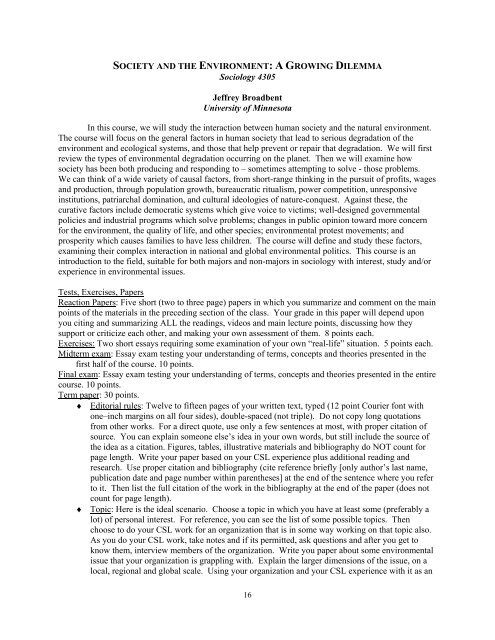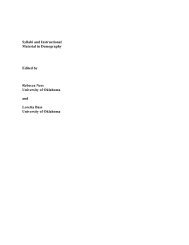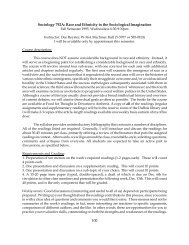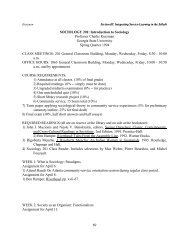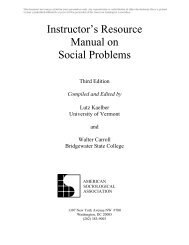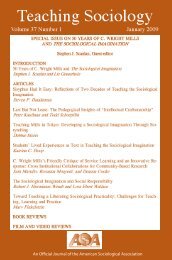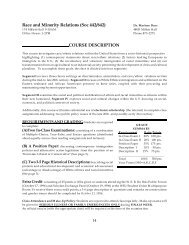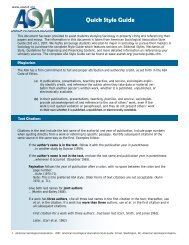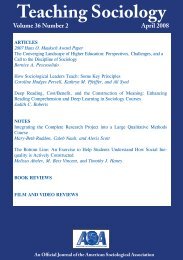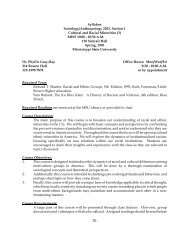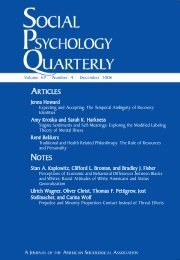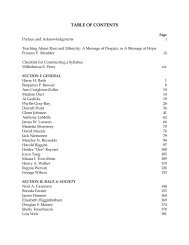Environmental Sociology - American Sociological Association
Environmental Sociology - American Sociological Association
Environmental Sociology - American Sociological Association
You also want an ePaper? Increase the reach of your titles
YUMPU automatically turns print PDFs into web optimized ePapers that Google loves.
SOCIETY AND THE ENVIRONMENT: A GROWING DILEMMA<br />
<strong>Sociology</strong> 4305<br />
Jeffrey Broadbent<br />
University of Minnesota<br />
In this course, we will study the interaction between human society and the natural environment.<br />
The course will focus on the general factors in human society that lead to serious degradation of the<br />
environment and ecological systems, and those that help prevent or repair that degradation. We will first<br />
review the types of environmental degradation occurring on the planet. Then we will examine how<br />
society has been both producing and responding to – sometimes attempting to solve - those problems.<br />
We can think of a wide variety of causal factors, from short-range thinking in the pursuit of profits, wages<br />
and production, through population growth, bureaucratic ritualism, power competition, unresponsive<br />
institutions, patriarchal domination, and cultural ideologies of nature-conquest. Against these, the<br />
curative factors include democratic systems which give voice to victims; well-designed governmental<br />
policies and industrial programs which solve problems; changes in public opinion toward more concern<br />
for the environment, the quality of life, and other species; environmental protest movements; and<br />
prosperity which causes families to have less children. The course will define and study these factors,<br />
examining their complex interaction in national and global environmental politics. This course is an<br />
introduction to the field, suitable for both majors and non-majors in sociology with interest, study and/or<br />
experience in environmental issues.<br />
Tests, Exercises, Papers<br />
Reaction Papers: Five short (two to three page) papers in which you summarize and comment on the main<br />
points of the materials in the preceding section of the class. Your grade in this paper will depend upon<br />
you citing and summarizing ALL the readings, videos and main lecture points, discussing how they<br />
support or criticize each other, and making your own assessment of them. 8 points each.<br />
Exercises: Two short essays requiring some examination of your own “real-life” situation. 5 points each.<br />
Midterm exam: Essay exam testing your understanding of terms, concepts and theories presented in the<br />
first half of the course. 10 points.<br />
Final exam: Essay exam testing your understanding of terms, concepts and theories presented in the entire<br />
course. 10 points.<br />
Term paper: 30 points.<br />
♦ Editorial rules: Twelve to fifteen pages of your written text, typed (12 point Courier font with<br />
one–inch margins on all four sides), double-spaced (not triple). Do not copy long quotations<br />
from other works. For a direct quote, use only a few sentences at most, with proper citation of<br />
source. You can explain someone else’s idea in your own words, but still include the source of<br />
the idea as a citation. Figures, tables, illustrative materials and bibliography do NOT count for<br />
page length. Write your paper based on your CSL experience plus additional reading and<br />
research. Use proper citation and bibliography (cite reference briefly [only author’s last name,<br />
publication date and page number within parentheses] at the end of the sentence where you refer<br />
to it. Then list the full citation of the work in the bibliography at the end of the paper (does not<br />
count for page length).<br />
♦ Topic: Here is the ideal scenario. Choose a topic in which you have at least some (preferably a<br />
lot) of personal interest. For reference, you can see the list of some possible topics. Then<br />
choose to do your CSL work for an organization that is in some way working on that topic also.<br />
As you do your CSL work, take notes and if its permitted, ask questions and after you get to<br />
know them, interview members of the organization. Write you paper about some environmental<br />
issue that your organization is grappling with. Explain the larger dimensions of the issue, on a<br />
local, regional and global scale. Using your organization and your CSL experience with it as an<br />
16


